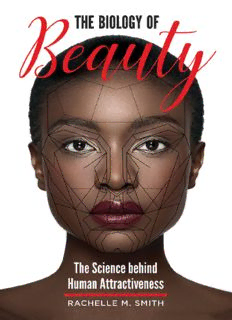
The Biology of Beauty: The Science Behind Human Attractiveness PDF
Preview The Biology of Beauty: The Science Behind Human Attractiveness
The Biology of Beauty This page intentionally left blank The Biology of Beauty The Science behind Human Attractiveness RACHELLE M. SMITH Copyright © 2018 by ABC-CLIO, LLC All rights reserved. No part of this publication may be reproduced, stored in a retrieval system, or transmitted, in any form or by any means, electronic, mechanical, photocopying, recording, or otherwise, except for the inclusion of brief quotations in a review, without prior permission in writing from the publisher. Library of Congress Cataloging-in-Publication Data Names: Smith, Rachelle M., author. Title: The biology of beauty : the science behind human attractiveness / Rachelle M. Smith. Description: Santa Barbara : Greenwood, 2018. | Includes bibliographical references and index. Identifiers: LCCN 2018001414 (print) | LCCN 2018015682 (ebook) | ISBN 9781440849893 (ebook) | ISBN 9781440849886 (alk. paper) Subjects: LCSH: Aesthetics—Physiological aspects. | Beauty, Personal. | Interpersonal attraction. Classification: LCC BH301.P45 (ebook) | LCC BH301.P45 S65 2018 (print) | DDC 153.7/58—dc23 LC record available at https://lccn.loc.gov/2018001414 ISBN: 978-1-4408-4988-6 (print) 978-1-4408-4989-3 (ebook) 22 21 20 19 18 1 2 3 4 5 This book is also available as an eBook. Greenwood An Imprint of ABC-CLIO, LLC ABC-CLIO, LLC 130 Cremona Drive, P.O. Box 1911 Santa Barbara, California 93116-1911 www.abc-clio.com This book is printed on acid-free paper Manufactured in the United States of America Contents Preface vii Part I: Understanding Beauty 1 1. Defining Beauty 3 2. The Benefits of Beauty 31 3. Buying Beauty 53 4. Changes in Beauty Trends over Time 81 5. Evolution’s Impact on Modern Attraction: The Interaction of Genes and Environment 97 6. The Impact of Attractiveness on Behavior and Relationship Satisfaction 117 7. Psychological Effects of the Preoccupation with Beauty 141 Part II: Beauty from Head to Toe 165 Head, Facial, and Body Hair 165 Skin 176 Face Shape and Structure 183 Eyes 189 vi Contents Nose 194 Ears 195 Lips 197 Teeth 200 Hands 203 Body Shape and Proportions 204 Breasts and Buttocks 215 Muscularity 217 Inguinal Crease 218 Male Genitalia 218 Feet 219 Hormonal Influences on Attraction 221 Psychological Traits 231 Glossary 233 References and Further Reading 241 Index 253 Preface From the time of the ancient Egyptians and Greeks, human attractive- ness has been analyzed, sought, and revered. Specific proportions such as the golden ratio were initially thought to underlie perfection. Even then, researchers believed there was a fundamental relationship between attrac- tiveness and other positive health, behavioral, and personal qualities. Current scientific research continues to explore what it is that makes some- one physically a ttractive and how those traits relate to other qualities. Many psychology and evolutionary researchers have built careers studying beauty and physical attraction around the world, examining the underpinnings of what is beautiful and how beauty relates to success, physical and mental health, opportunities, friendships, sexual relationships, behavior, and mar- riage. Their research has added to a foundation of understanding what it means to be attractive and the biological underpinnings of beauty. Research clearly demonstrates a universal conception of beauty that is largely consis- tent throughout the world regardless of age, culture, political system, reli- gion, mating style, or government structure. The goal of this book is to explore these similarities to discover the underlying biology of beauty. The book explores basic questions surrounding what is considered beautiful, the benefits of beauty, how individuals try to make themselves more attractive (now and in the past), beauty trends in the United States, the evolutionary explanation for attraction, the impact of attractiveness on relationships, and the psychological effects of a preoccupa- tion with attractiveness. viii Preface Part I of this book reviews empirical research that reveals the major con- tributors to physical attractiveness. Chapter 1 breaks down the individual aspects that constitute objective and subjective beauty. These range from traits such as symmetrical proportions of the body and face, and signs of youth and health, to interpersonal traits such as personality, ambition, and familiarity. Once beauty is defined, Chapter 2 explores the biological and social benefits of possessing such traits. Chapter 3 assesses the research on how individuals of average attractiveness can make themselves more beau- tiful and the impact such changes have on reaping the benefits of beauty. Chapter 4 looks at changes in standards of attractiveness throughout time and the media’s impact on beauty trends in the Unites States. Chapter 5 examines the role of evolution on attraction and relationships. Chapter 6 assesses how attractiveness impacts relationship satisfaction and longevity, and Chapter 7 analyzes the psychological effects that result from the quest to meet beauty standards. In Part II, specific body parts are examined to assess the research on what makes each attractive. Part II also includes cultural sidebars that examine specific and conflicting beauty trends in cultures around the world and throughout history. Part I Understanding Beauty
Description: